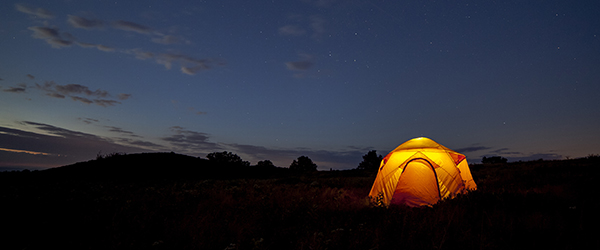You know it’s camping season when the weather gets warmer and the ground starts sprouting signs of life. If these signs weren’t clear enough, National Park Week is April 15-23, begging us to get outside and enjoy the fresh air.
Spending days fishing at Grand Lake, or hiking in the Arbuckle Mountains, and nights sleeping under the stars can be a great refresher after a bitter winter — but only if you have the right gear.
Thanks to byproducts made from oil and natural gas, goods ranging from tough nylon tents to plastic-wrapped energy bars are available for us to use anytime we venture outdoors.

- Tent. Without one of these, there is nothing to protect you from the raw elements of nature. Wind, rain and unwanted guests — siblings or bears — are all possibilities without a tent. Nylon is one of the most durable synthetic fibers out there and is made from petroleum byproducts.
- Smartphone. What’s the point of seeing nature if you can’t post it on your Instagram? On a more serious note, you’ll want to have a phone on you for emergency calls and that nifty GPS if you get a little turned around. Where would we be without Google Maps? Our modern phones are made from plastics derived from oil and natural gas byproducts.
- Hiking Boots. Tromping around in the wild can be dangerous without sturdy shoes built for traversing boulders or running from snakes. Synthetic rubber, which makes up the soles of most boots comes directly from petroleum.
- Bug Spray. Zika. West Nile. Malaria. These are all diseases that mosquitos can carry. Protect yourself. Aerosol and the plastic used in bug spray cans comes directly from byproducts of oil and natural gas.
- Backpack. How are you going to carry everything on this list without one of these? While backpacks can be made from almost anything, most of the best outdoor backpacks are made up of synthetic fibers like nylon, which, you guessed it, are petroleum-based.
- Sleeping Bag. While backpacks hold your stuff, sleeping bags hold you. Like a Chipotle burrito. Like other camping elements, sleeping bags can be made from a variety of materials, but the best ones come from petroleum-based synthetic fibers.
- Emergency Kit. Sometimes nature wins. When that happens, you’ll want a well put together emergency kit complete with bandages, aspirin and an emergency reflector blanket, all of which contain synthetic fibers and coatings that come from oil and natural gas.
- Sun Protection. Sunlight is great in moderation. Just a little bit gives you that nice summer bronze. But, too much sun could really ruin your trip. Make sure you bring some sunglasses and sunscreen so you can enjoy the warmth without the burn. Of course, sunglasses and sunscreen both contain petroleum-based plastics.
- Food. With all that hiking, fishing and sleeping outside, you’re bound to get hungry. And when that fishing hook comes up empty — again — you’ll want to have brought some provisions. Energy bars are great for mid-hike snacks. And who can have a campfire without s’mores? The wrappers for all these foods are made from petroleum-based plastics that keep your food fresh and keep the bears and raccoons from stealing your treats.
- Fishing Pole. Is there anything better than casting a reel in the early morning calm, and then … waiting? If you eventually catch something, you can thank oil and natural gas for the plastics in the reel and the nylon line that can hold onto “the big one” you’re dying to catch.
Once you have the right gear, it’s time to get outside and enjoy the great American wilderness. If you’re not sure where to go for National Parks Week, here are a couple parks to experience right here in Oklahoma: https://www.nps.gov/state/ok/index.html

